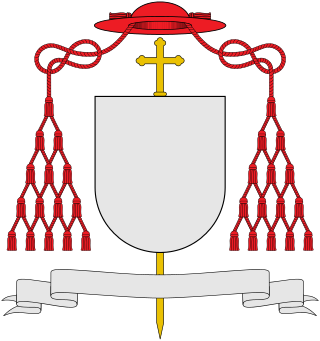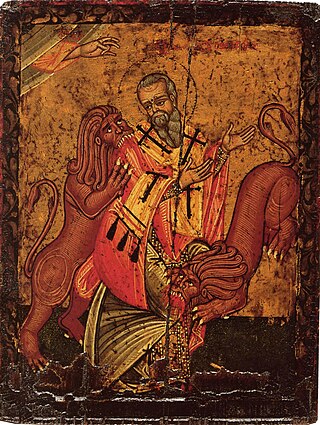
A cardinal is a senior member of the clergy of the Catholic Church. Cardinals are created by the pope and typically hold the title for life. Collectively, they constitute the College of Cardinals. The most solemn responsibility of the cardinals is to elect a new pope in a conclave, almost always from among themselves, when the Holy See is vacant. During the period between a pope's death or resignation and the election of his successor, the day-to-day governance of the Holy See is in the hands of the College of Cardinals. The right to participate in a conclave is limited to cardinals who have not reached the age of 80 years by the day the vacancy occurs. In addition, cardinals collectively participate in papal consistories, in which matters of importance to the Church are considered and new cardinals may be created. Cardinals of working age are also appointed to roles overseeing dicasteries of the Roman Curia, the central administration of the Catholic Church.

The word catholic comes from the Greek phrase καθόλου 'on the whole, according to the whole, in general', and is a combination of the Greek words κατά 'about' and ὅλος 'whole'. The first known use of "Catholic" was by the church father Saint Ignatius of Antioch in his Letter to the Smyrnaeans. In the context of Christian ecclesiology, it has a rich history and several usages.
Latin is an Italic language, originally spoken in ancient Rome and its empire.

The pope, also known as the supreme pontiff, Roman pontiff or sovereign pontiff, is the bishop of Rome, head of the worldwide Catholic Church, and has also served as the head of state or sovereign of the Papal States and later the Vatican City State since the eighth century. From a Catholic viewpoint, the primacy of the bishop of Rome is largely derived from his role as the apostolic successor to Saint Peter, to whom primacy was conferred by Jesus, who gave Peter the Keys of Heaven and the powers of "binding and loosing", naming him as the "rock" upon which the Church would be built. The current pope is Francis, who was elected on 13 March 2013.
Roman or Romans most often refers to:

Western Christianity is one of two subdivisions of Christianity. Western Christianity is composed of the Latin Church and Western Protestantism, together with their offshoots such as the Old Catholic Church, Independent Catholicism and Restorationism.
The term Latin has been used to refer to several groups of people across various historical periods who have been, in some form or another, connected to ancient Rome and its ethnic, cultural, and/or religious legacy.
Rome is the English name of the capital of Italy. The city, called Roma in Latin and Italian, was also the capital of the Roman Empire and the seat of the papacy.
Papa is a word used in many languages as an affectionate term for father.
The highest-ranking bishops in Eastern Orthodoxy, Oriental Orthodoxy, the Catholic Church, the Hussite Church, Church of the East, and some Independent Catholic Churches are termed patriarchs.
A pontiff was, in Roman antiquity, a member of the most illustrious of the colleges of priests of the Roman religion, the College of Pontiffs. The term pontiff was later applied to any high or chief priest and, in Roman Catholic ecclesiastical usage, to bishops, especially the Pope, who is sometimes referred to as the Roman Pontiff or the Supreme Pontiff.

The Eastern Catholic Churches or Oriental Catholic Churches, also called the Eastern-Rite Catholic Churches, Eastern Rite Catholicism, or simply the Eastern Churches, are 23 Eastern Christian autonomous particular churches of the Catholic Church, in full communion with the Pope in Rome. Although they are distinct theologically, liturgically, and historically from the Latin Church, they are all in full communion with it and with each other. Eastern Catholics are a distinct minority within the Catholic Church; of the 1.3 billion Catholics in communion with the Pope, approximately 18 million are members of the eastern churches.
Holy Roman Church, Roman Church, Church of Rome or Church in Rome may refer to:
The hierarchy of the Catholic Church consists of its bishops, priests, and deacons. In the ecclesiological sense of the term, "hierarchy" strictly means the "holy ordering" of the church, the Body of Christ, so to respect the diversity of gifts and ministries necessary for genuine unity.
The term City of God may refer to The City of God, a fifth-century book by St. Augustine of Hippo, and subsequently to the Roman Catholic Church and its unity with civil power, such as existed between it and the Holy Roman Empire in the Middle Ages.
Catholicity is a concept of pertaining to beliefs and practices that are widely accepted by numerous Christian denominations, most notably by those Christian denominations that describe themselves as catholic in accordance with the Four Marks of the Church, as expressed in the Nicene Creed formulated at the First Council of Constantinople in 381: "[I believe] in one, holy, catholic, and apostolic Church." The English adjective catholic is derived from the Ancient Greek adjective καθολικός, meaning "general", "universal". Thus, "catholic" means that in the Church the wholeness of the Christian faith, full and complete, all-embracing, and with nothing lacking, is proclaimed to all people without excluding any part of the faith or any class or group of people. An early definition for what is "catholic" was summarized in what is known as the Vincentian Canon in the 5th century Commonitory: "what has been believed everywhere, always, and by all."
The term Roman Catholic is used to differentiate the Catholic Church and its members in full communion with the pope in Rome from other Christians who identify as "Catholic". It is also sometimes used to differentiate adherents to the Latin Church and its use of the Roman Rite from Catholics of the Eastern Catholic Churches. It is not the official name preferred by the Holy See or bishops in full communion with the pope as a designation for their faith or institution.




